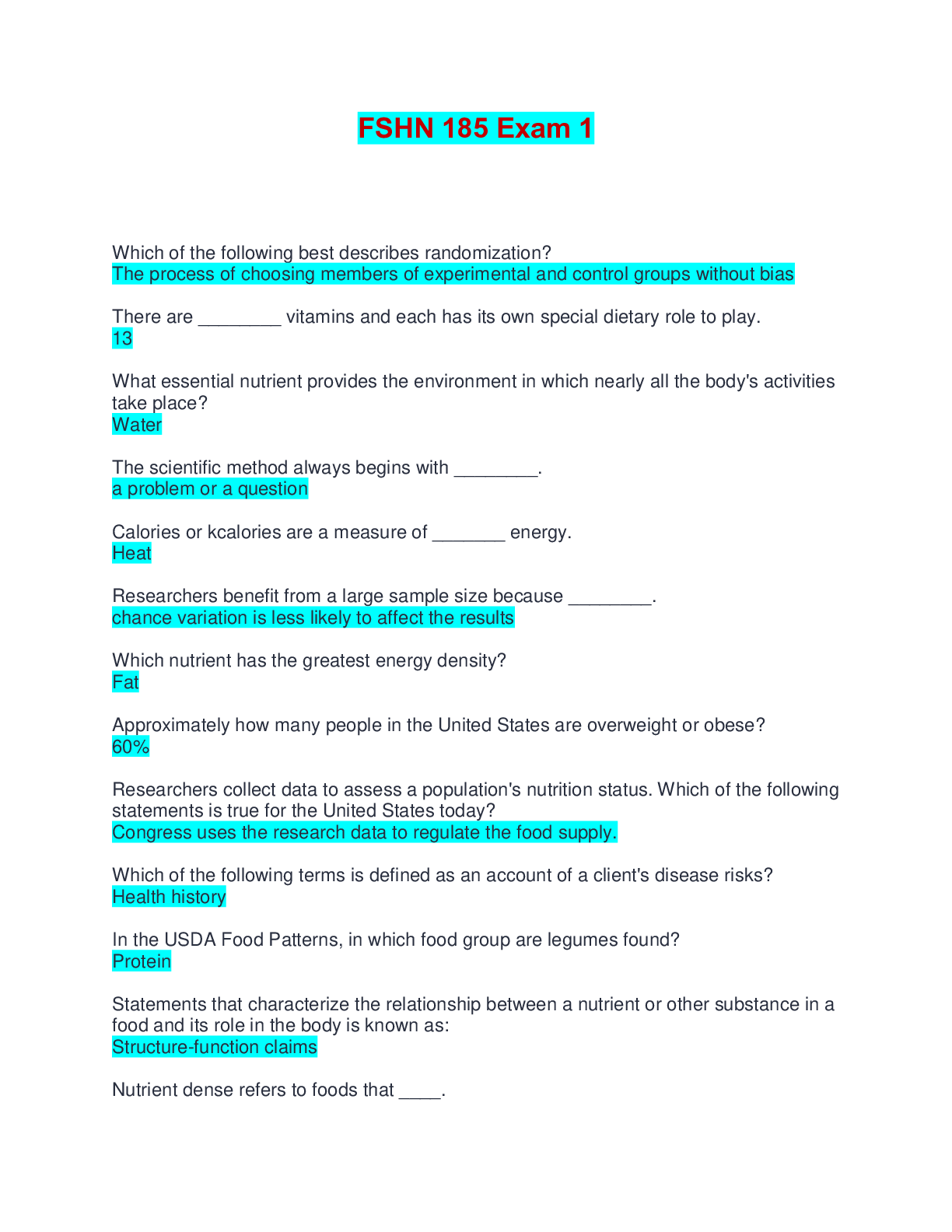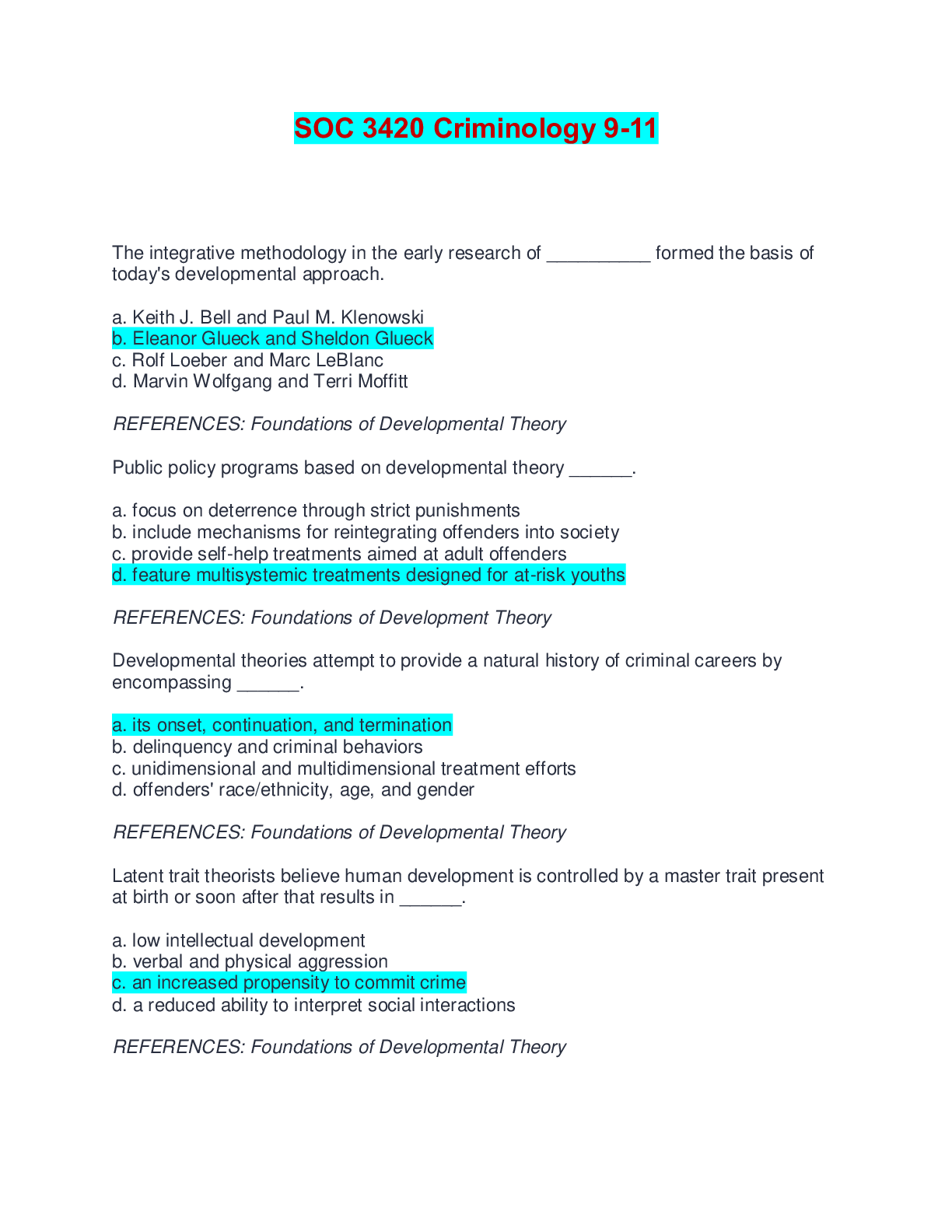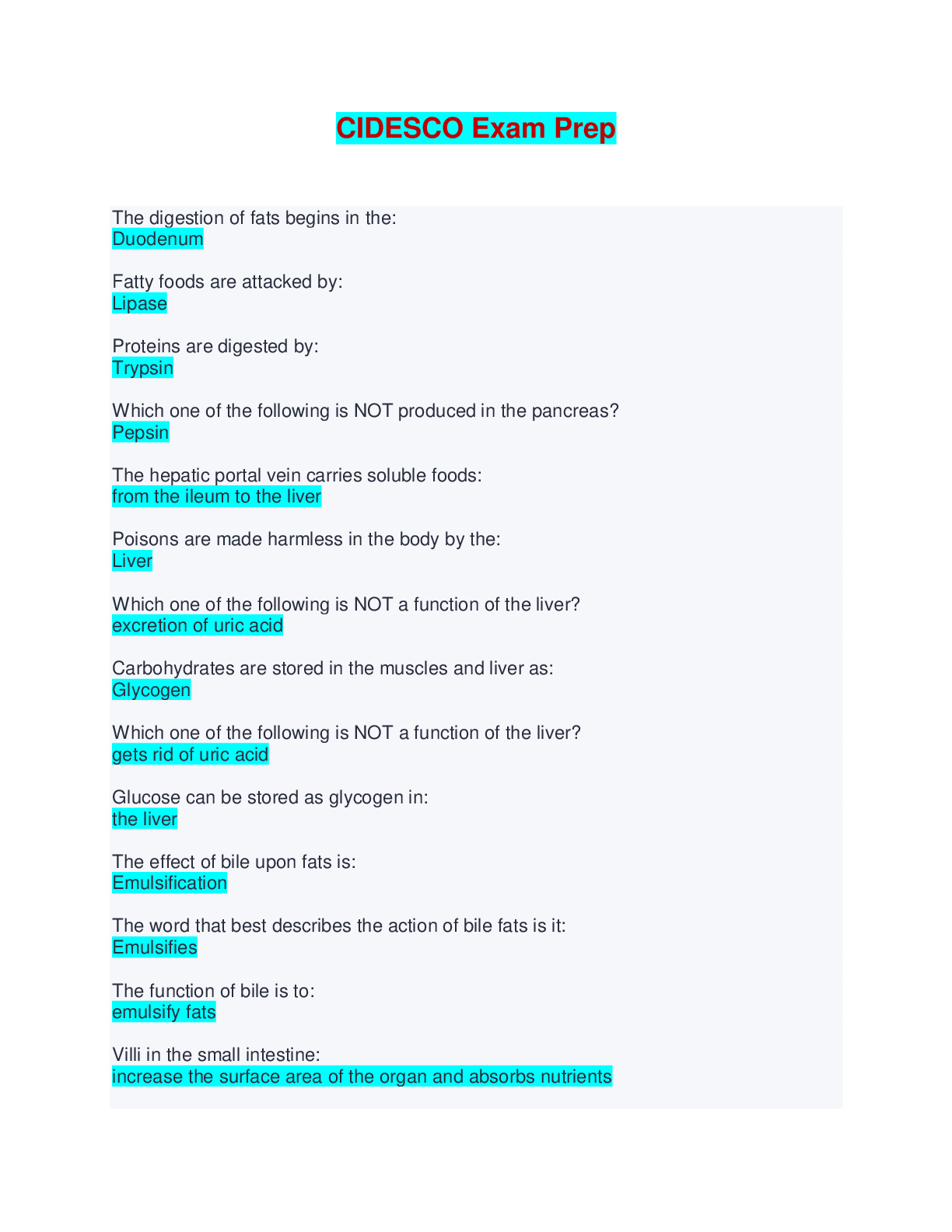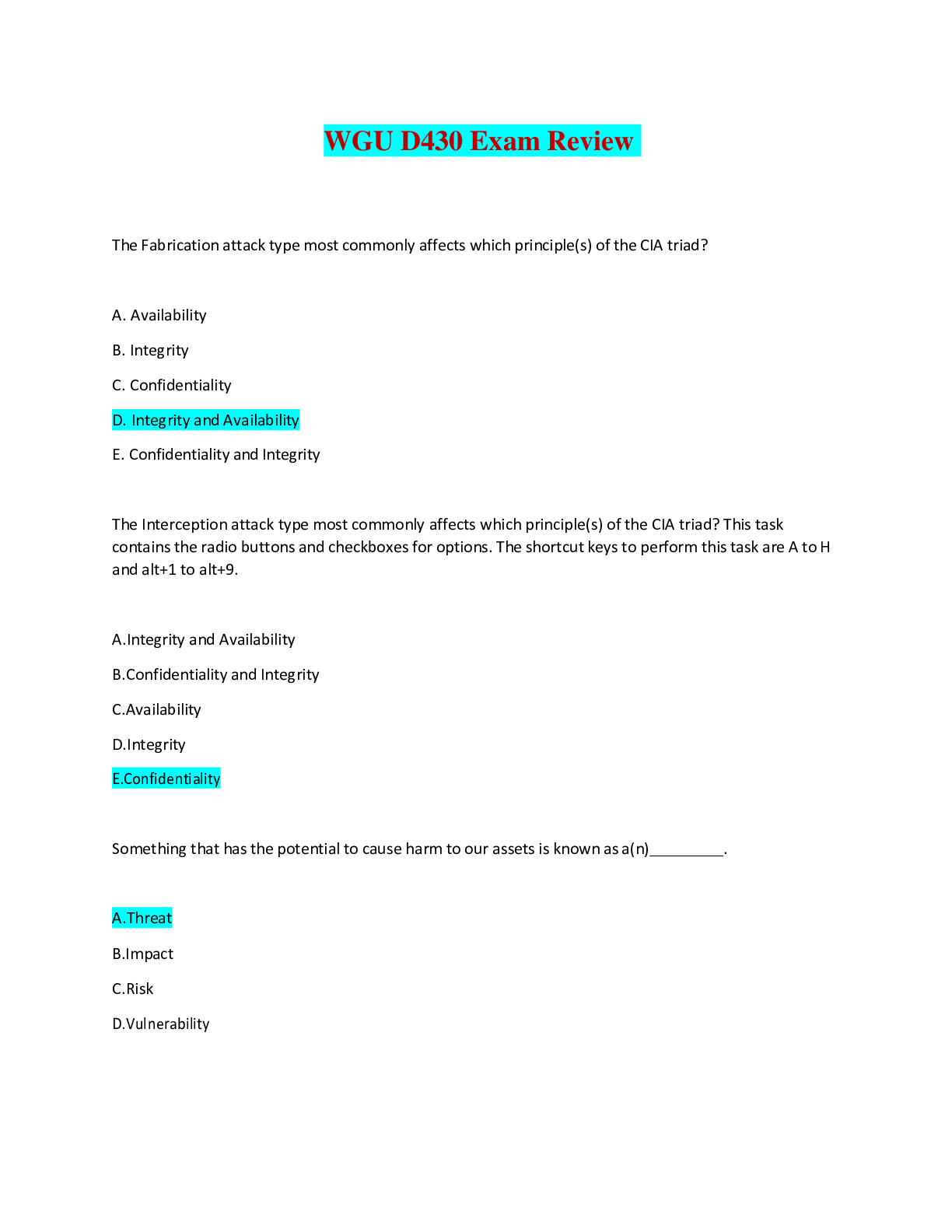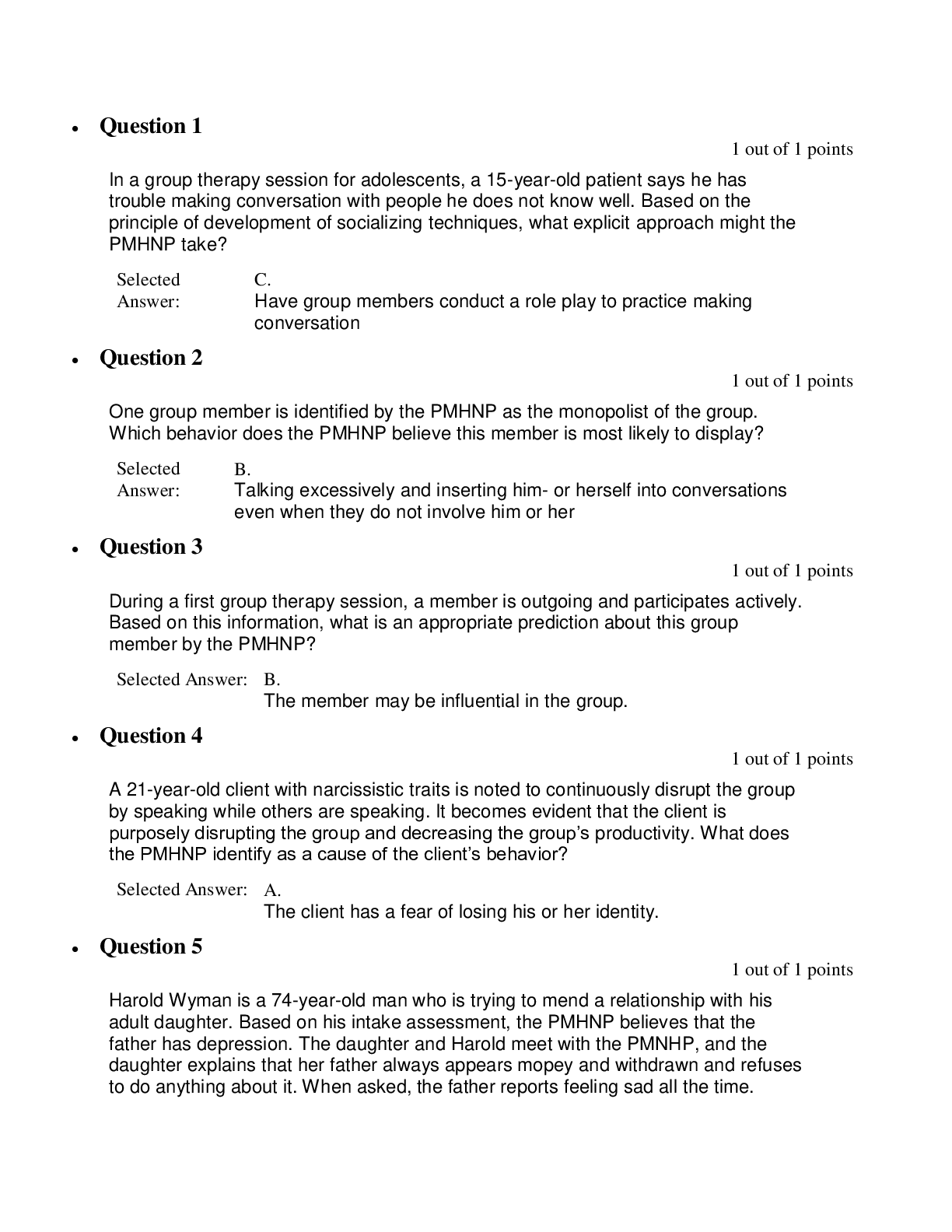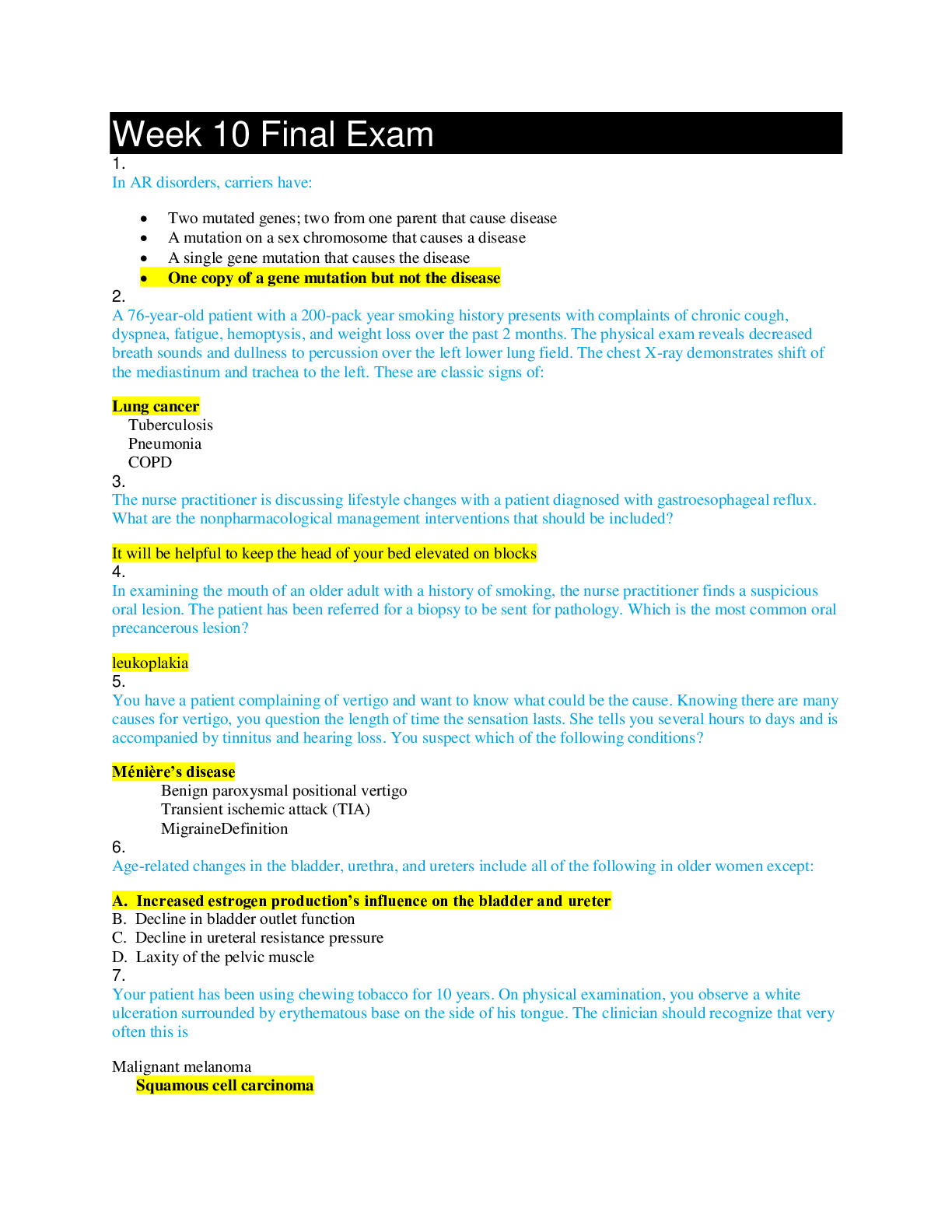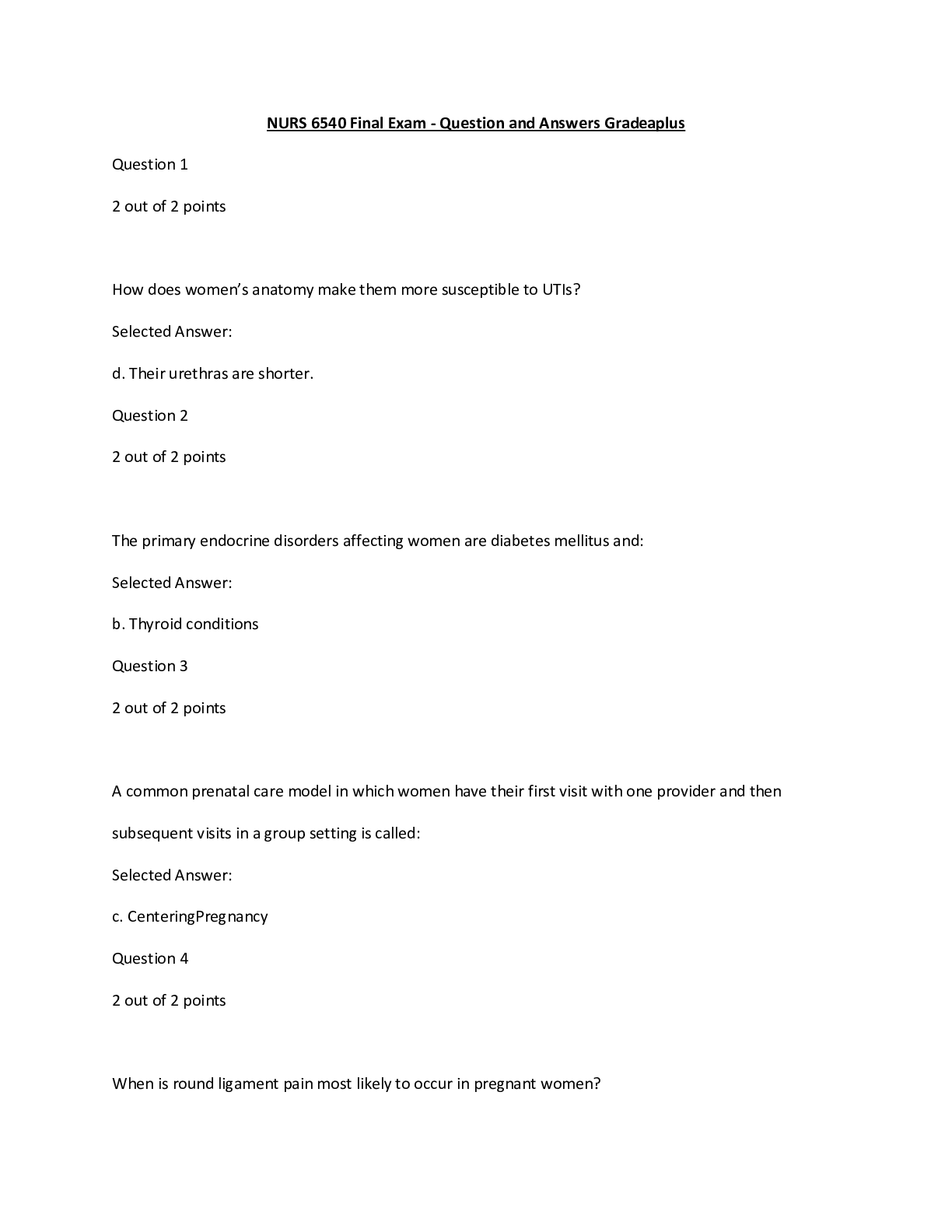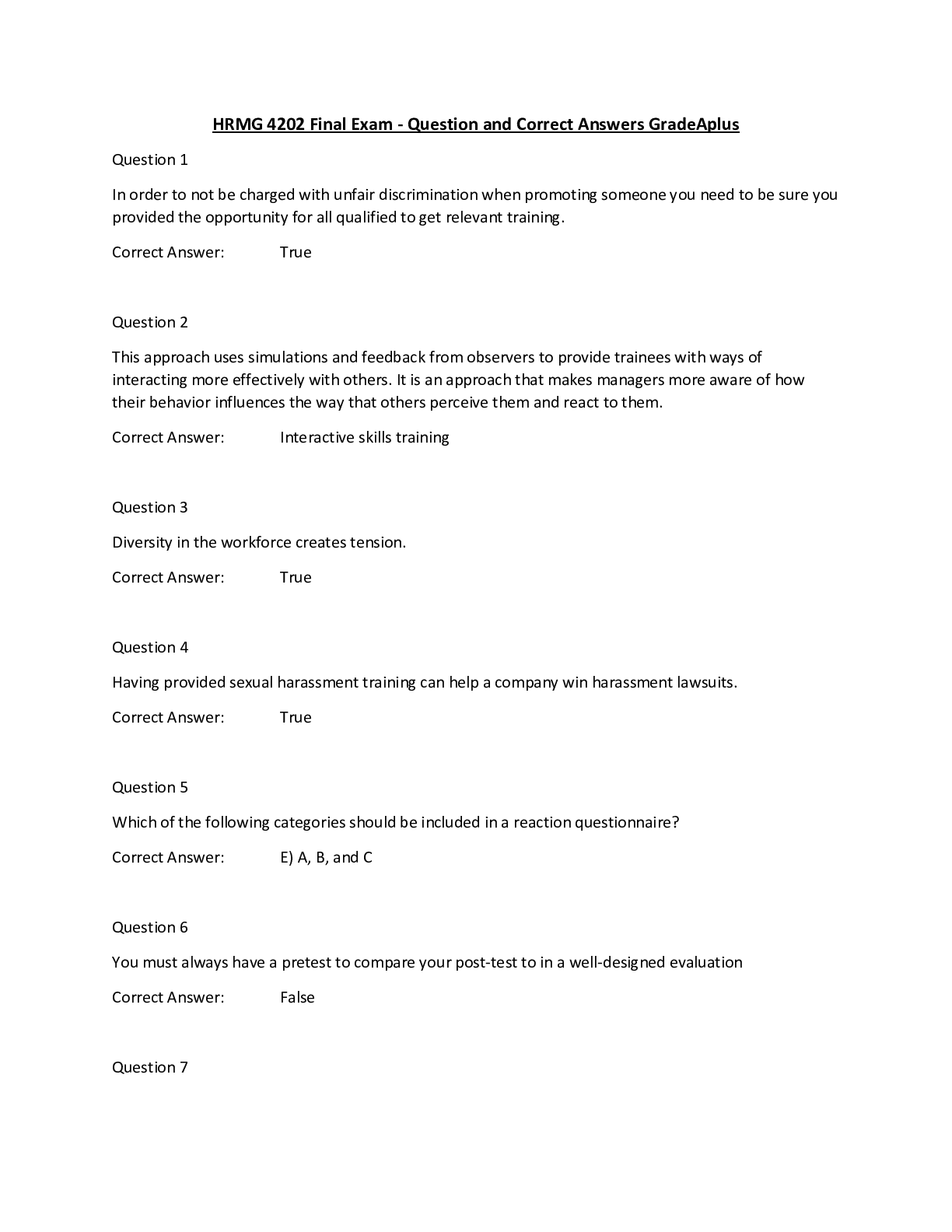NSG 6340 Final Exam - 100%Correct Questions and Answers - Rated A+
Document Content and Description Below
NSG 6340 Final Exam 1. Question: Bipolar disease requires _____________ for successful treatment. Question 2. Question: Juvenile rheumatoid arthritis is ________. Quest... ion 3. Question: An example of a Schedule IV drug is ________________. Question 4. Question: Your prescription pad should include _____________. Question 5. Question: Testing for hemophilia includes evaluation for Factor _____. Question 6. Question: The final word on the scope of practice for an advanced practice nurse ___________. Question 7. Question: Which statement is true regarding anorexia nervosa? Question 8. Question: The reliving of a very personal, negative, or traumatic event, repeatedly, is known as ________________. Question 9. Question: Juvenile rheumatoid arthritis is believed to be _______________. Question 10. Question: The SSRI withdrawal system is best characterized as _______________. Question 11. Question: The two primary sources of inflammatory bowel disease are _____________. Question 12. Question: If you have concerns that a patient has suicidal ideations, you should _____________. Question 13. Question: An antidepressant should be taken by a patient for at least _________ to adequately treat depressive symptoms. Question 14. Question: A fifteen-year-old presents at your practice, complaining of muscle weakness with fainting spells. She has recently lost 15 lb. in three months, and her parents state that she spends a lot of time by herself. In obtaining the patient history, your priority question should be regarding the girl’s ___________. Question 15. Question: Which of the following is true regarding an innocent murmur? Question 16. Question: Still’s murmur ________________. Question 17. Question: An example of a Schedule I drug is ___________. Question 18. Question: Rules or regulations _________________. Question 19. Question: Which of the following statements regarding nurse practitioners is true? Question 20. Question: A twenty-two-year-old female presents with cachexia and yellowing skin, and her body weight is 20% below her ideal weight. You suspect she has _____________. Question 21. Question: One of the common symptoms of leukemia is ____________. Question 22. Question: Which drug class would be utilized for an initial episode of mania? Question 23. Question: Which of the following patients is at a higher risk for a suicide attempt? Question 24. Question: The number one psychological disorder in the United States has been identified as _________. Question 25. Question: Schedule III and Schedule IV drugs are _______________. Question 26. Question: Most patients with hypertension are categorized as having ________ hypertension. Question 27. Question: The symptoms of a pathological heart murmur include ___________________________. Question 28. Question: Individuals with low levels of serotonin may have difficulty with _________. Question 29. Question: A major depressive disorder must not be related to ____________________. Question 30. Question: The highest risk factor for type 2 diabetes mellitus is _______. Question 31. Question: A potential side effect of an antihypertensive medication in a male would be _______. Question 32. Question: ______________ for a nineteen-year-old male with stage 1 hypertension. Question 33. Question: The preferred drug for treatment of an initial episode of mania is ___________. Question 34. Question: Bipolar disease is often diagnosed in ____________________. Question 35. Question: Which of the following physical stigmata are common in newborns with Down syndrome? Question 36. Question: A Doctor of Nursing practice (DNP) is considered _______________. Question 37. Question: The most common malignancy in children and adolescents is ____________. Question 38. Question: As a nurse practitioner, it is reasonable for you to assume that every patient will ___________. Question 39. Question: The most common symptom of a patient with atrial septal defect (ASD) is _______________. Question 40. Question: A clinical feature of Kawasaki disease is ___________________. Question 41. Question: ______________ Schedule III drugs. Question 42. Question: The best practice situation is one in which the scope of practice is defined _______________. Question 43. Question: A Schedule I drug _______________. Question 44. Question: The definition of an advanced practice nurse is determined by __________. Question 45. Question: A Schedule II drug _____________________. Question 46. Question: The presence of repetitive physical or mental rituals is known as ___________. Question 47. Question: The incidence of congenital heart defects is estimated to be ________ of all live births. Question 48. Question: Which of the following is not a symptom of cystic fibrosis? Question 49. Question: Using the criteria of SIG E CAPS, how many positive responses would lead to a diagnosis of a major depressive disorder? Question 50. Question: What should be asked prior to prescribing any medication? Question 51. Question: The initial presentation of hemophilia is often _______. Question 52. Question: _____________ is the only one of the top ten causes of death that has no preventative or curative options. Question 53. Question: Pauciarticular arthritis is identified by pain in ___________. Question 54. Question: A patient who has multiple ideas regarding suicide attempts should _______________. Question 55. Question: An example of long-acting insulin is ________________. Question 56. Question: A seventy-year-old patient presents with visual hallucinations, episodic delirium, fluctuating cognitive abilities, and short-term memory impairment. You suspect this patient has ________. Question 57. Question: _______ create higher costs than all other medical problems. Question 58. Question: Your fourteen-year-old male patient presents with fatigue, endocarditis, pulmonary hypertension, arrhythmias, and congestive heart failure. You suspect he may have ____________. Question 59. Question: A typical febrile seizure is most likely to be the problem in which of the following children? Question 60. Question: In managing a child with hemophilia, your priority would be ______________. Question 61. Question: A characteristic feature of polyarticular juvenile idiopathic arthritis disease is ______. Question 62. Question: The most common form of dementia is ______________. Question 63. Question: A Schedule IV drug _______________________. Question 64. Question: Parents of a fourteen-month-old male present at your clinic, concerned about their child’s history of simple febrile seizures. The child has just experienced a second febrile seizure related to a high fever that developed with an ear infection. The parents are questioning you regarding the use of antiseizure medication. Which statement would be the most appropriate? Question 65. Question: Panic disorder symptoms include ______________. Question 66. Question: When prescribing medications for a patient, you must consider _____________. Question 67. Question: A Schedule V drug _________________. Question 68. Question: The Nurse Practice Act _____________. Question 69. Question: ___________ has been found to be the most effective way to reduce the risk of dementia. Question 70. Question: The presence of uncontrollable, unrelenting, and excessive worry is known as _______. Question 71. Question: The board of nursing for each state ___________. Question 72. Question: The most common form of juvenile rheumatoid arthritis is ____________. Question 73. Question: ______ are the fastest-growing division of our population today. Question 74. Question: According to the American Academy of Nurse Practitioners, the scope of practice for a nurse practitioner includes _________________. Question 75. Question: If your patient presents with a triglyceride level of 200 mg/dL and no other risk factors, what is your first instruction for treatment? Question 76. Question: The four “R” rules of prescribing are __________________. Question 77. Question: If a state has two licensing boards that regulate nurse practitioners, the two boards are usually ______________________________ _. Question 78. Question: The priority of treatment of a patient with a psychiatric disorder is to __________. Question 79. Question: The topmost risk factor for dementia is _______. Question 80. Question: Schedule II drugs are ______________. Question 81. Question: The services that a nurse practitioner may provide are determined by _________. Question 82. Question: The onset of dementia is usually noted over a period of ___________. Question 83. Question: If you suspect that your adolescent patient is suicidal, you should ________. Question 84. Question: A mental status examination to determine cognitive function is ________________. Question 85. Question: Acetylcholinesterase inhibitors may be used ______________. Question 86. Question: The insulin requirement for a type 1 diabetic is determined by ___________. Question 87. Question: Isolated systolic hypertension is due to __________. Question 88. Question: Dementia usually involves loss of memory, loss of cognitive abilities, and loss of __________. Question 89. Question: Juvenile rheumatoid arthritis symptoms include _________. Question 90. Question: The board of nursing in each state is responsible for _____________. Question 91. Question: Kawasaki disease is most common in _________________. Question 92. Question: Insulin therapy should be initiated if a patient has an HgbA1c > ______. Question 93. Question: The first line of treatment for juvenile rheumatoid arthritis is ______________. Question 94. Question: An example of a Schedule V drug is ___________. Question 95. Question: An example of a Schedule II drug is ______________. Question 96. Question: Which of the following symptoms are not typical of a child with attention-deficit/ hyperactivity disorder? Question 97. Question: Hemophilia is _______ recessive trait. Question 98. Question: The family of a sixty-five-year-old female complains that the patient is losing weight, is socially withdrawn, and makes frequent trips to the restroom during or after meals. You suspect the patient may have _____________. Question 99. Question : Thoughts that are false but persistent are known as _________ ideations. Question 100. Question : You note your seventy-five-year-old patient has developed a shuffling gait and short-term memory loss and smells of urine. You suspect this patient has ____________. [Show More]
Last updated: 2 years ago
Preview 1 out of 25 pages
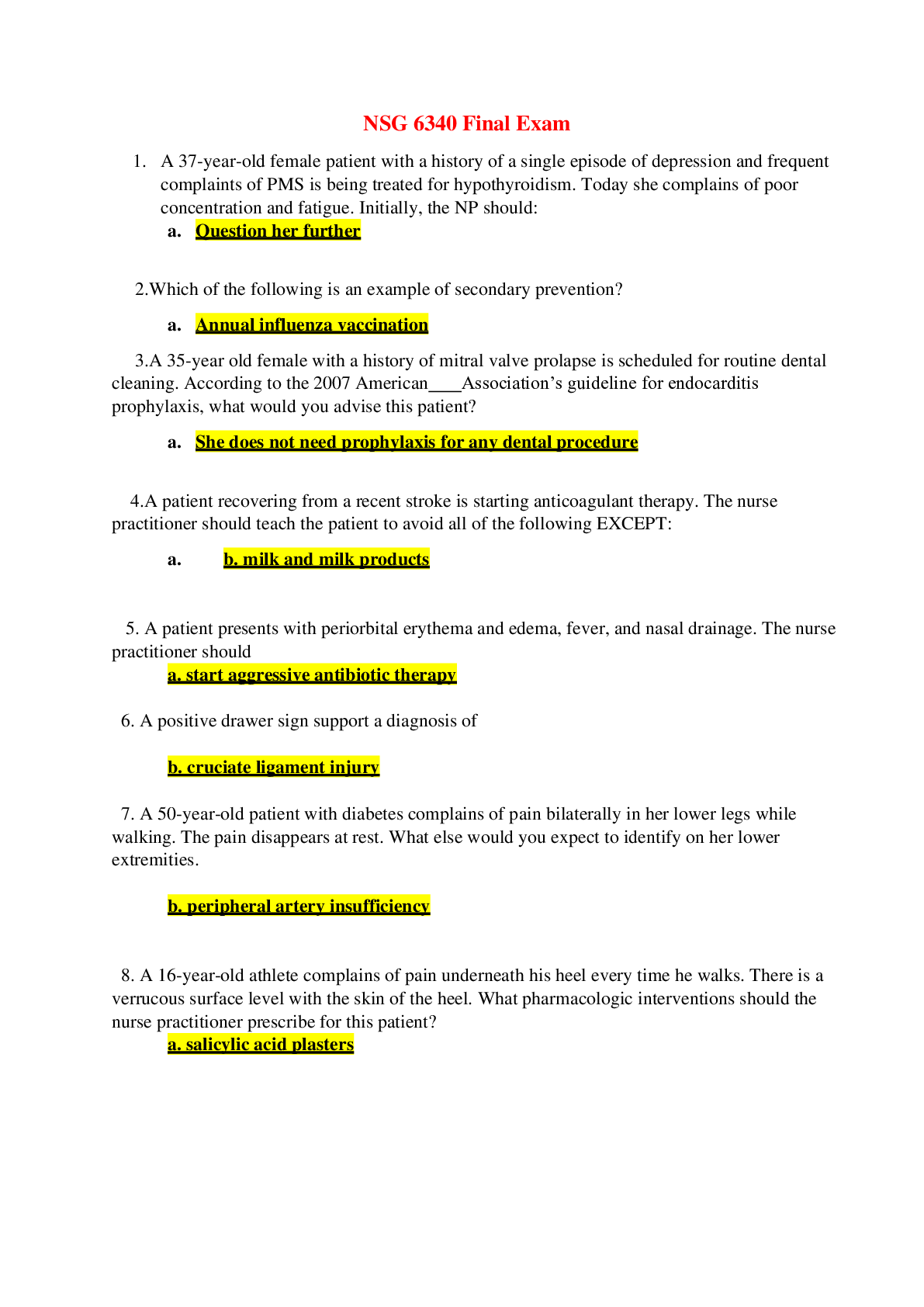
Buy this document to get the full access instantly
Instant Download Access after purchase
Buy NowInstant download
We Accept:

Reviews( 0 )
$13.00
Can't find what you want? Try our AI powered Search
Document information
Connected school, study & course
About the document
Uploaded On
Jan 08, 2021
Number of pages
25
Written in
Additional information
This document has been written for:
Uploaded
Jan 08, 2021
Downloads
0
Views
83



